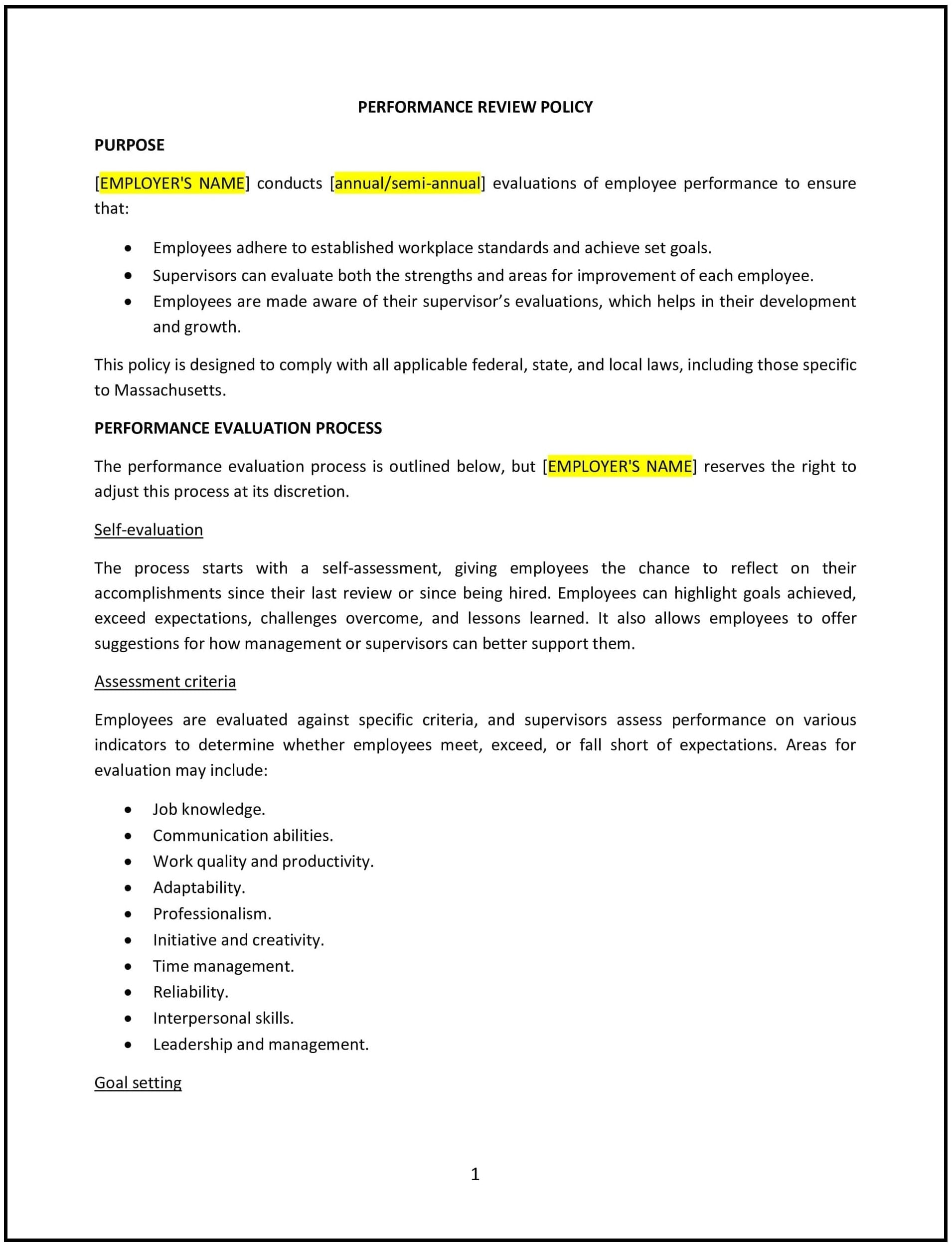Performance review policy (Massachusetts): Free template
Got contracts to review? While you're here for policies, let Cobrief make contract review effortless—start your free review now.

Customize this template for free
This performance review policy is designed to help Massachusetts businesses establish a structured approach to evaluating employee performance. The policy outlines the process, timing, and criteria for conducting performance reviews, setting expectations for both employees and managers. It ensures that the performance review process is fair, consistent, and compliant with Massachusetts state laws and federal regulations.
By adopting this policy, businesses can improve employee performance, promote professional development, and ensure that performance reviews align with company goals and values.
How to use this performance review policy (Massachusetts)
- Define performance review process: Specify the process for conducting performance reviews, including the timing (e.g., annually, semi-annually) and the steps involved (e.g., self-assessment, manager evaluation, feedback sessions). The policy should outline the roles of both employees and managers during the review process.
- Establish clear criteria for performance: Clearly define the performance criteria that will be used to evaluate employees. This could include factors such as job knowledge, quality of work, productivity, teamwork, communication, and adherence to company values. The criteria should be specific, measurable, and aligned with the company’s objectives.
- Address goal setting and development: The policy should encourage goal setting for employees during the review process. Employees and managers should work together to set specific, measurable, achievable, relevant, and time-bound (SMART) goals. This will help employees understand expectations and work towards continuous improvement.
- Provide feedback and support: Include guidelines for providing constructive feedback during the performance review. Managers should be trained to deliver feedback that is specific, actionable, and focused on both strengths and areas for improvement. The policy should also specify how feedback will be documented and communicated.
- Link performance to compensation and rewards: The policy should outline how performance reviews may impact compensation, promotions, bonuses, and other rewards. Employees should be informed about how their performance is tied to career advancement and company incentives.
- Address performance improvement plans (PIPs): If an employee’s performance is unsatisfactory, the policy should outline how performance improvement plans (PIPs) will be used. The policy should specify the steps for developing a PIP, including setting clear expectations, providing support, and monitoring progress over a set period.
- Ensure compliance with Massachusetts and federal laws: Ensure that the policy complies with Massachusetts state laws, including anti-discrimination laws and regulations that impact employee evaluations. The policy should also align with federal regulations related to equal employment opportunity (EEO) and fair treatment during performance reviews.
- Review and update regularly: Periodically review and update the policy to ensure it remains aligned with best practices, Massachusetts state laws, and any changes in company operations or objectives.
Benefits of using this performance review policy (Massachusetts)
This policy offers several benefits for Massachusetts businesses:
- Promotes employee growth and development: By establishing clear performance criteria and development goals, businesses can support employees in their professional growth, helping them improve their skills and reach their potential.
- Increases productivity: Regular performance reviews help identify areas where employees may need support or additional training, which can ultimately improve productivity and efficiency across the organization.
- Ensures consistency and fairness: A structured performance review process ensures that all employees are evaluated using the same criteria, promoting fairness and transparency in the evaluation process.
- Enhances employee engagement: Employees who receive regular feedback and have a clear understanding of expectations are more likely to be engaged and motivated in their roles, leading to higher job satisfaction and retention.
- Aligns performance with company objectives: By linking performance reviews to company goals, businesses can ensure that employees’ efforts are aligned with organizational priorities, leading to better overall performance.
- Reduces legal risks: By following a consistent and documented performance review process, businesses can reduce the risk of legal challenges related to employment decisions, such as promotions, compensation adjustments, or terminations.
Tips for using this performance review policy (Massachusetts)
- Communicate the policy clearly: Ensure that all employees understand the performance review policy, including how and when reviews will be conducted, what criteria will be used, and the purpose of the reviews. Communicate this through employee handbooks, onboarding, and training.
- Train managers on feedback delivery: Provide managers with training on how to deliver constructive, actionable feedback during performance reviews. Managers should be trained to provide both positive reinforcement and areas for improvement to promote employee development.
- Maintain consistency: Ensure that performance reviews are conducted consistently across all departments and levels within the company. This includes using the same evaluation criteria and process for all employees.
- Monitor employee progress: After performance reviews, monitor employees' progress toward their goals and offer support or additional resources if necessary. Follow up on any performance improvement plans (PIPs) to ensure that employees receive the support they need to succeed.
- Use performance data for decision-making: Use the data gathered from performance reviews to inform decisions about promotions, salary adjustments, training needs, and other employment matters. This helps ensure that decisions are made based on objective performance metrics.
- Review and update regularly: Periodically review the policy to ensure it aligns with changes in Massachusetts state laws, federal regulations, and best practices in performance management. Update the policy as necessary to reflect the evolving needs of the company and employees.